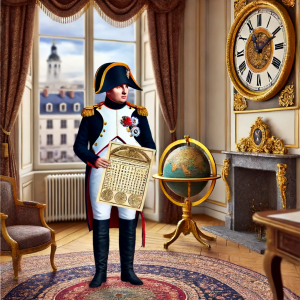 In the annals of history, the changes ushered in by revolutions often leave indelible marks on the societies they reshape. The French Revolution was no exception, sweeping away centuries of tradition in a fervent quest for liberty, equality, and fraternity. Among its many radical transformations was the introduction of the French Revolutionary Calendar in 1793, a system designed to break with the past and embody revolutionary ideals. Yet, this new calendar, with its ten-day weeks and renamed months, was short-lived. On June 16, 1806, Napoleon Bonaparte, a figure synonymous with the revolutionary era’s end and the dawn of a new order, restored the Gregorian calendar. This article delves into the reasons behind Napoleon’s decision and its implications for France.
In the annals of history, the changes ushered in by revolutions often leave indelible marks on the societies they reshape. The French Revolution was no exception, sweeping away centuries of tradition in a fervent quest for liberty, equality, and fraternity. Among its many radical transformations was the introduction of the French Revolutionary Calendar in 1793, a system designed to break with the past and embody revolutionary ideals. Yet, this new calendar, with its ten-day weeks and renamed months, was short-lived. On June 16, 1806, Napoleon Bonaparte, a figure synonymous with the revolutionary era’s end and the dawn of a new order, restored the Gregorian calendar. This article delves into the reasons behind Napoleon’s decision and its implications for France.
The French Revolutionary Calendar was introduced as a symbol of the new republic, reflecting the desire to distance the nation from its monarchical and religious past. It featured 10-day weeks, months named after seasonal characteristics, and a new year beginning on the autumn equinox. Despite its symbolic value, the calendar proved to be highly impractical for daily life.
The ten-day week, intended to increase productivity and break the cycle of religious observance, caused confusion and discontent among the populace. Farmers, merchants, and laborers found it difficult to adapt, and the lack of a regular Sunday rest day met with resistance, particularly in rural areas where traditional Catholic practices remained strong. The calendar’s complex structure also posed significant administrative challenges, further complicating its implementation.
Napoleon Bonaparte, having risen to power by 1799, was keenly aware of the need to stabilize and unify France. His decision to restore the Gregorian calendar was rooted in several key motivations.
Consolidation of Power: Napoleon aimed to solidify his rule and promote a sense of continuity and stability. By eliminating one of the more radical remnants of the Revolution, he sought to present himself as a pragmatic leader who could bridge the revolutionary past and a stable future. The reversion to the Gregorian calendar was a strategic move to align the nation with more traditional, and broadly accepted, systems.
Reconciliation with the Catholic Church: The Concordat of 1801, an agreement between Napoleon and Pope Pius VII, had already marked a significant step in mending the fractured relationship between the state and the Catholic Church. Restoring the Gregorian calendar, with its regular Sunday observance, was a continuation of this policy. It helped appease the religious populace and clergy, securing Napoleon’s support from a crucial societal pillar.
Economic and Administrative Efficiency: The Gregorian calendar was internationally recognized and used by France’s major trading partners. By reinstating it, Napoleon aimed to simplify administrative processes, facilitate international trade, and improve economic coordination. This change was crucial for a nation striving to rebuild its economy after years of revolutionary upheaval and warfare.
The re-adoption of the Gregorian calendar brought immediate practical benefits. It improved coordination for civil and military planning, streamlined bureaucratic operations, and made scheduling more straightforward. The general populace, already struggling with the complexities of the Revolutionary Calendar, welcomed the return to a familiar system. This move reduced confusion and dissatisfaction, helping to stabilize everyday life in France.
Napoleon’s restoration of the Gregorian calendar was a calculated decision that reflected his broader strategy for consolidating power and stabilizing France. It bridged the revolutionary past with a more pragmatic present, facilitating economic efficiency, public acceptance, and reconciliation with the Church. This change, seemingly a small administrative adjustment, symbolized a return to order and continuity that characterized much of Napoleon’s approach to governance.
In restoring the Gregorian calendar, Napoleon not only simplified the lives of his citizens but also cemented his legacy as a ruler who could navigate the tumultuous waters of revolutionary change and emerge with a stable and unified France. The calendar’s restoration stands as a testament to Napoleon’s ability to blend pragmatism with politics, securing his place in history as a transformative figure.
Leave a comment